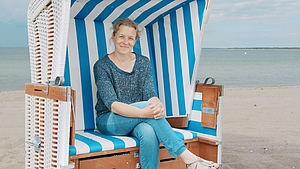1. What exciting topics are you currently working on?
My research is on vision in marine mammals. Currently I am setting my main focus on (1) the perception of optic flow, which marine mammals might perceive when swimming underneath the water surface or above ground. They might also perceive optic flow when swimming through particle-rich waters, a situation which has previously only be considered to be detrimental to vision. Moreover, I am interested in unraveling (2) the mechanisms of orientation/navigation that these animals use when travelling their habitat on the prowl for food or when heading back to their haul-out places and (3) neural processes of visual perception.
2. How would you summarise your career path?
My career path can be summarized with two words: chance and persistency. My first steps into biology were largely determined by chance: by chance I was studying biology in Freiburg and by chance I got to know harbor seals and the sensory research involving these amazing creatures. The subsequent steps were largely determined by persistency, meaning that I worked hard to follow my goals overcoming ups and downs by being persistent.
3. Where do your best ideas emerge from?
My largest inspiration comes from just observing the “things” surrounding me. New ideas “are born” when having a look at the sea when cycling on the breakwater on my way to the institute or when spending some time at the edge of our enclosures watching the seals. Moreover, new ideas “are born” when listening to/interacting with other people, especially with those outside my field – it may only be a word or a quick comment by someone that will influence my thoughts and can lead to a new research question.
4. Who or what had or has had the strongest positive influence on your career and work?
There are – at least – two researchers that had strong positive influences on my career and work: Guido Dehnhardt, my PhD/Postdoc supervisor, long-term mentor and now colleague, and Almut Kelber, with whom I had the pleasure to work closely together during my research fellowship in the Lund Vision Group – I greatly appreciate them challenging me by their very personal, and for me even sometimes “out-of-the-box” way of thinking.
5. What do you consider the greatest challenge or hurdle for progress in your field?
There might be very specific challenges one could mention here, but I think the biggest challenge is allocation of time. We need to (be allowed to) allocate a lot of/enough/more time to our passion, research, including time to read literature carefully and critically, to engage in real discussions and develop ideas, to exchange with researchers in- and outside our field of research.
6. What are, in your opinion, the opportunities, directions or decisions that are vital to progress neurosciences?
In my opinion, progress will depend on the amount of time that each researcher can allocate to research, referring to my answer to the fifth question – thus we should rethink and reorganize processed in general to allow focusing on science. Moreover, progress will depend on how/what we teach the next generations of scientists. I am convinced that it is vital to teach critical thinking and provide platforms for in-depth discussions and respectful exchange for example.
7. Tell us what would have to happen in your work for you to say “A dream has come true!”?
Among the many, many smaller and larger dreams I have conducting behavioral experiments on sensory perception, orientation and navigation with our trained harbor seals in the world’s largest marine mammal laboratory, the open ocean, is an important one – on the day, we will be out in the open ocean taking data with our seals, the team and I will definitely say “A dream has come true!”
8. What was your greatest experience as a scientist?
I always consider the moments when I finish data collection under extraordinary experimental conditions or when I happen to have the possibility to meet and chat with excellent researchers as great experiences.
9. What has been your biggest scientific failure so far, and how do you deal with failed experiments and defeats?
Please allow me to answer the questions in reversed order. I wished I could say that I can easily overcome moments in which I feel my experiment/project has failed. To the contrary, to be honest, I am often “struggling” if something is not going the way I anticipated. But here is where my persistency comes into play again – persistency makes me continue hoping that one day I will be able to succeed – maybe years afterwards. That is science: science is largely about failing and retrying. Numerous projects are in this “intermediate state” – and I will only be able to answer the question about my biggest scientific failure at the end of my career when I will have to admit that one of these projects will have “really failed”.
10. With which historical person, politician or celebrity would you like to have a dinner and discuss your work?
For me it is really hard to choose one person – I wish I could invite numerous people for dinner. But, recently, I read about Neil Harbisson who considers himself a cyborg. He was born with achromatopsia. Later in his life, he got an antenna implanted in his skull which allows him to feel colors. Listening to his talks has already had a large impact on the way I think about perception – thus it might be interesting to exchange ideas about sensory perception with Neil Harbisson over dinner.
Prof. Dr. Frederike Hanke
Marine Science Center
Institute for Biosciences
University of Rostock

